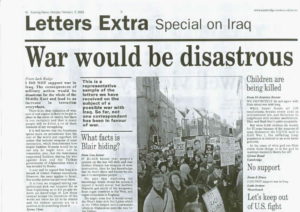How can we understand the context and consequences of wars in the twenty-first century?
Our project explored how media audiences tried to make sense of complex global events, including media coverage of conflict. To enable this analysis, we surveyed younger media audiences about the range of their media use and the tools they employed to contextualise and analyse coverage of global conflict. We also undertook content analysis of one broadsheet and one tabloid newspaper, choosing time-periods that reflected key events in public discussion of global conflict, such as the Chilcot Inquiry.
We found that UK media continues to frame discussions of war with references to UK involvement in the 2003 Iraq war. As a result, war was presented as a matter arising from the personal ambitions, plans and weaknesses of the powerful.
Much of the newspaper coverage focused on the Impact of global conflict on the UK as a matter of increasing numbers of refugees. UK interests are seen to revolve around the containment or avoidance of events that trigger further movements of refugees. In particular, coverage of Syria in our chosen time-periods repeatedly referenced the ‘threat’ of refugees – although not always explicitly in terms of impact on the UK. In relation to Syria in particular, deleting the term ‘refugee’ from the search excluded the majority of news articles.
Surveying UK media and UK media audiences reveals an unevenness in coverage of conflicts around the world. There is little opportunity for media audiences to grasp the longer histories of many conflicts or to understand the context, politics or competing interests in play in any conflict. Instead, conflicts are presented as potential causes of population movement.
Click on the image below to see more about “Imaginging War/s”
Photo credit: Rennett Stowe (CC BY SA 2.0)
Click on the image below to see more about the coverage of the Iraq war in the UK media.
Photo credit: Gerald Simmons (CC BY NC SA 2.0)
Below is a slideshow on the UK’s relationship with Libya.
The UK and LibyaThe slideshow can also be downloaded here.
To cite or link, please uses this reference: http://dx.doi.org/10.15123/DATA.00000216


